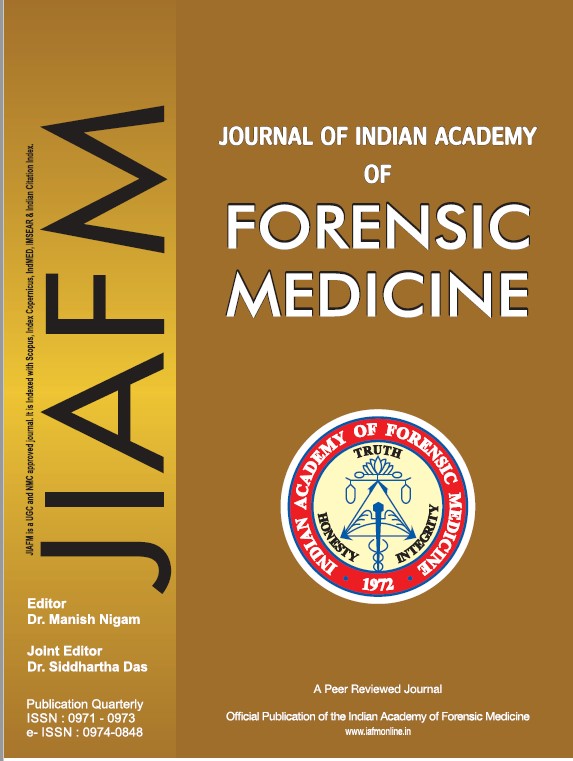Alleged Snake Bite with Fatal Antemortem Aspiration: A diagnostic Conundrum
DOI:
https://doi.org/10.48165/jiafm.2023.45.1.22Keywords:
Snakebite, False claims, Aspiration, Myocardial infarctionAbstract
The determination of the cause of death in the alleged snake bite deaths presents a great challenge for autopsy surgeons at autopsy. Unwitnessed bites, improper history, unavailable clinical records, and absent bite marks on the external examination often impact the assessment of snakebite deaths by autopsy surgeons. This is even more complicated when the snake bite involves an unusual or obscure site, for example, the scalp. It is often encountered in neurotoxic snake bites which are associated with minimal or no local findings at the bite site. We describe a case of an alleged snake bite on the head, wherein the relatives of the deceased old lady claimed that the cobra bit her on the vertex region of the scalp before being brought dead to the hospital. However, significant life-threatening conditions such as fatal myocardial infarction and antemortem aspiration of food up to the terminal bronchiole were found at the autopsy rather than evidence of snakebite. The role of autopsy surgeons in such cases is described in this report.
Downloads
References
World Health Organization. Snakebite in India [Internet]. [cited 2022, Jun 14]. Available from: https://www.who.int /india/health-topics/snakebite
Government of Odisha. State Specific Disorders, Order No: 1936/R&DM (SR) dated 1st June, 2015 [Internet]. 2015. Available from: https://srcodisha.nic.in/dmrule/State_ Specific_Disaster_01.06.2015.pdf
Reddy K. The Essentials of Forensic Medicine and rd Toxicology. 33 ed. Murthy OP, editor. New Delhi: Jaypee Brothers Medical Publishers; 2014.
Kumar KPN. Finally, a way to detect snake venom in the blood. The Times of India. 2003; Available from: https://timesofindia.indiatimes.com/city/hyderabad/finally a-way-to-detect-snake-venom-in-the-blood/articleshow /166173.cms
Gutiérrez JM, Calvete JJ, Habib AG, Harrison RA, Williams DJ, Warrell DA. Snakebite envenoming. Nat Rev Dis Prim. 2017;3(1):17063. Available from: http://www.nature.com /articles/nrdp201763
th 6. Pillay VV. Modern Medical Toxicology. 4 ed. Jaypee
Brothers Medical Publishers; 2013.
Maduwage KP, Gawarammana IB, Gutiérrez JM, Kottege C, Dayaratne R, Premawardena NP, et al. Enzyme immunoassays for detection and quantification of venoms of Sri Lankan snakes: Application in the clinical setting. Casewell NR, editor. PLoS Negl Trop Dis. 2020;14(10): e0008668. Available from: https://dx.plos.org/10.1371 /journal.pntd.0008668
Hu X, Yi ES, Ryu JH. Aspiration-related deaths in 57 consecutive patients: Autopsy study. PLoS One. 2014;9(7):1–5.
Dogan D, Arslan Y, Cagin A. Effect of aspiration risk on mortality in older age pneumonia cases. Med Sci | Int Med J. 2018;7(4):837.
Dimaio VJM, Molina DK. DiMaio's Forensic Pathology. 3rd ed. Boca Raton: CRC Press; 2021;242.
Aggrawal A. Textbook of Forensic Medicine and Toxicology. 1st ed. New Delhi, India: Avichal Publishing Company; 2014;185.
Gelperin A. Sudden Death in an Elderly Population from Aspiration of Food. J Am Geriatr Soc. 1974;22(3):135–6.
Shim YK, Kim N, Park YH, Lee J-C, Sung J, Choi YJ, et al. Effects of Age on Esophageal Motility: Use of High resolution Esophageal Impedance Manometry. J Neurogastroenterol Motil. 2017;23(2):229–36. Available from: http://www.jnmjournal.org/journal/view.html?doi =10.5056/jnm16104


